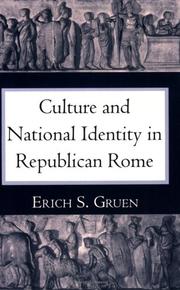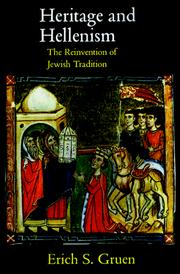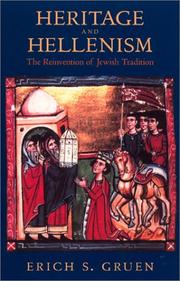| Listing 1 - 10 of 31 | << page >> |
Sort by
|
Book
ISBN: 3515087354 9783515087353 Year: 2005 Volume: Bd. 8 Publisher: Stuttgart Franz Steiner Verlag
Abstract | Keywords | Export | Availability | Bookmark
 Loading...
Loading...Choose an application
- Reference Manager
- EndNote
- RefWorks (Direct export to RefWorks)
Culture diffusion --- Civilization, Ancient --- Diffusion culturelle --- Civilisation ancienne --- Congresses --- Congresses. --- Congrès --- Congrès --- Cultural diffusion --- Diffusion of culture --- Culture --- Social change
Book
ISBN: 0030776201 Year: 1970 Publisher: New York : Holt, Rinehart and Winston,
Abstract | Keywords | Export | Availability | Bookmark
 Loading...
Loading...Choose an application
- Reference Manager
- EndNote
- RefWorks (Direct export to RefWorks)
City-states --- Rome --- History --- Foreign relations --- Histoire --- Relations extérieures --- Foreign relations. --- Relations extérieures

ISBN: 0801427592 0801480418 Year: 1992 Volume: 52 Publisher: Ithaca, N.Y. : Cornell University Press,
Abstract | Keywords | Export | Availability | Bookmark
 Loading...
Loading...Choose an application
- Reference Manager
- EndNote
- RefWorks (Direct export to RefWorks)
Rome --- Civilization --- Greek influences --- Civilisation --- Influence grecque --- Civilization. --- -Greek influences. --- Rome (Italy) --- Greek influences. --- Greece

ISBN: 0520929195 0585103356 9780520929197 9780585103358 0520210522 Year: 1998 Publisher: Berkeley, Calif. University of California Press
Abstract | Keywords | Export | Availability | Bookmark
 Loading...
Loading...Choose an application
- Reference Manager
- EndNote
- RefWorks (Direct export to RefWorks)
The interaction of Jew and Greek in antiquity intrigues the imagination. Both civilizations boasted great traditions, their roots stretching back to legendary ancestors and divine sanction. In the wake of Alexander the Great's triumphant successes, Greeks and Macedonians came as conquerors and settled as ruling classes in the lands of the eastern Mediterranean. Hellenic culture, the culture of the ascendant classes in many of the cities of the Near East, held widespread attraction and appeal. Jews were certainly not immune. In this thoroughly researched, lucidly written work, Erich Gruen draws on a wide variety of literary and historical texts of the period to explore a central question: How did the Jews accommodate themselves to the larger cultural world of the Mediterranean while at the same time reasserting the character of their own heritage within it? Erich Gruen's work highlights Jewish creativity, ingenuity, and inventiveness, as the Jews engaged actively with the traditions of Hellas, adapting genres and transforming legends to articulate their own legacy in modes congenial to a Hellenistic setting. Drawing on a diverse array of texts composed in Greek by Jews over a broad period of time, Gruen explores works by Jewish historians, epic poets, tragic dramatists, writers of romance and novels, exegetes, philosophers, apocalyptic visionaries, and composers of fanciful fables—not to mention pseudonymous forgers and fabricators. In these works, Jewish writers reinvented their own past, offering us the best insights into Jewish self-perception in that era.
Judaism --- Greek literature --- Hellenism. --- Jews --- Judaism and literature --- Hellenism --- Religion --- Philosophy & Religion --- Hellenistic Judaism --- Judaism, Hellenistic --- Literature and Judaism --- Literature --- Jewish learning and scholarship --- Religions --- Semites --- Balkan literature --- Byzantine literature --- Classical literature --- Classical philology --- Greek philology --- History --- Jewish authors --- History and criticism. --- Apologetic works --- History and criticism --- Intellectual life --- adaptation. --- alexander the great. --- ancient history. --- ancient jewish history. --- ancient jewish literature. --- ancient jews. --- antiquity. --- assimilation. --- conquerors. --- conquest. --- drama. --- dramatists. --- early judaism. --- epic poetry. --- greek. --- hellenic culture. --- hellenism. --- hellenistic judaisms. --- history. --- jewish history. --- jewish identity. --- jewish literature. --- jewish writers. --- jewish. --- judaica. --- judaism. --- literary criticism. --- literature. --- macedonia. --- near east. --- nonfiction. --- philosophy. --- prophecy. --- prophets. --- religion. --- roman history. --- spirituality. --- theology.
Book
Year: 1968 Publisher: Cambridge (Mass.) : Harvard University Press,
Abstract | Keywords | Export | Availability | Bookmark
 Loading...
Loading...Choose an application
- Reference Manager
- EndNote
- RefWorks (Direct export to RefWorks)
Book
Year: 1923 Publisher: Cambridge, Mass. : Harvard University Press,
Abstract | Keywords | Export | Availability | Bookmark
 Loading...
Loading...Choose an application
- Reference Manager
- EndNote
- RefWorks (Direct export to RefWorks)
Book
Year: 1968 Publisher: Cambridge, Mass. : Harvard University Press,
Abstract | Keywords | Export | Availability | Bookmark
 Loading...
Loading...Choose an application
- Reference Manager
- EndNote
- RefWorks (Direct export to RefWorks)
Criminal courts --- Rome --- Politics and government --- Politique et gouvernement

ISBN: 0520235061 Year: 1998 Volume: 30 Publisher: Berkeley, Calif. ; London : University of California Press,
Abstract | Keywords | Export | Availability | Bookmark
 Loading...
Loading...Choose an application
- Reference Manager
- EndNote
- RefWorks (Direct export to RefWorks)
Judaism --- Greek literature --- Judaïsme --- Littérature grecque --- History --- Jewish authors --- History and criticism --- Apologetic works --- Histoire --- Ecrivains juifs --- Histoire et critique --- Ouvrages apologétiques
Book
Year: 1923 Publisher: Cambridge, Mass. : Harvard University Press,
Abstract | Keywords | Export | Availability | Bookmark
 Loading...
Loading...Choose an application
- Reference Manager
- EndNote
- RefWorks (Direct export to RefWorks)
Book
ISBN: 9783946317500 3946317502 Year: 2019 Publisher: Göttingen Vandenhoeck & Ruprecht
Abstract | Keywords | Export | Availability | Bookmark
 Loading...
Loading...Choose an application
- Reference Manager
- EndNote
- RefWorks (Direct export to RefWorks)
"In his contribution to the gragmentary Jewish historians of Hellensitic times and their treatement of the biblical tradition Erich Gruen shows not only that the fragments disclose a remarkable range and diversity of texts, but also that their authors' engagement with biblical texts was more light-hearted in tone, deliberately idiosyncratic, and, far from parochial in temperament, tended to connect with Hellenic and Near Eastern cultures in order to set Jewish traditions into a broader context. These historians did not see their mission primarily as setting the record straight. They provided arresting twists on biblical tales, alternative versions, provocative variations, and, almost always, some entertainment value. The sacrality of the Scriptures remained untouched."--
Greek literature, Hellenistic --- Jewish authors --- Bible. --- History of Biblical events.
| Listing 1 - 10 of 31 | << page >> |
Sort by
|

 Search
Search Feedback
Feedback About UniCat
About UniCat  Help
Help News
News